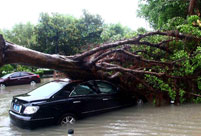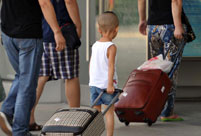Over the last decade, China's National Day holidays have repeatedly proved a nightmare. Hordes of people cluster at the congested resorts or on the jammed roads, and the bad manners of tourists cause a lot of quarrels and fights.
Before the golden week took off, ifeng.com, a Chinese news portal, made a wild guess and came up with a list of 10 pieces of news that would be probably reported.
Unfortunately and ironically, several of the predictions proved true, such as record amounts of trash in Tiananmen Square. More than 110,000 people left 5 tons of trash behind on the square after attending the flag-raising ceremony on October 1.
The lifting of road tolls during the seven days caused a lot of monster traffic jams nationwide. Jiuzhaigou, a famous natural resort located in Southwest China's Sichuan Province, was paralyzed because the transportation was obstructed. More than 4,000 tourists were stranded inside the scenic spot for 10 hours.
In Diqing Tibetan Autonomous Prefecture, Yunnan Province, arbitrary charges sharpened the conflicts between the tourists and the travel agencies. The local tourism administration interfered, suspending the guides' licenses and fining the involved agencies. But tourists' holidays were still ruined.
Questions and doubts were soon raised before the end of the vexing holidays. Why is the vacation becoming more disturbing instead of refreshing?
This long-lasting problem contains a wide range of interested parties, but they can be divided into two groups which respectively represent the need for "efficiency and fairness." How to strike a balance between the two is the key to whether China's vacation system works.
The government's effort to bolster the idea of taking a week-long vacation has massively boosted China's "vacation economy."
Many industries such as tourism and retail are the biggest beneficiaries. During last year's National Day holidays, more than 34.25 million tourists visited in 119 scenic spots, and the revenue amounted to 1.77 billion yuan ($288.22 million) in total.
But the visible profits that are earned by businesspeople are made at the cost of the invisible benefits of the population.
Forcibly launching a week-long vacation in lieu of some weekends afterward seems to mess up people's work-and-rest routine.
With more emphasis being put on "efficiency," super-long workweeks are forcefully created, exhausting workers and offsetting the refreshment they have acquired during the holidays.
Various suggestions have been made to try to revamp the current vacation system. A lot of voices are calling for introducing and solidifying mechanisms that have been proven successful in other countries, such as proper paid vacations, which exist in Chinese companies but are often not implemented.
These suggestions focus on "fairness," which extensively protects the benefits of workers so that they can enjoy more freedom to choose the appropriate days they want to take a break. But such "fairness" cannot be achieved without sacrificing "efficiency."
As for the tourism industry, when tourists get dispersed, they will lose the cluster effect, and the "efficiency" of economic growth will be probably much lowered. Most companies as well as the tourism authorities are unwilling to do so.
China is now at a crossroad where the mere pursuit of profits is being challenged by the growing requirements to defend individual rights. The debate over the vacation system can be seen in this light.
It has become increasingly difficult to place as much emphasis on how to make more profits as before. It is time to add more weight to the individual side.
 2013 Colour Me Rad 5K run held in Canada
2013 Colour Me Rad 5K run held in Canada China's destroyer Qingdao sails out of Sydney Harbor
China's destroyer Qingdao sails out of Sydney Harbor Chinese tycoon aims to restore London's Crystal Palace
Chinese tycoon aims to restore London's Crystal Palace Typhoon Fitow affects 4.56 million people in east China
Typhoon Fitow affects 4.56 million people in east China Game for the brave: 'Spiders' in Yandang Mountains
Game for the brave: 'Spiders' in Yandang Mountains Travel peak witnessed on last day of National Day holiday
Travel peak witnessed on last day of National Day holiday  New couples take wedding photos during holiday
New couples take wedding photos during holiday Serena Williams stumbles through to quarterfinals
Serena Williams stumbles through to quarterfinals Thailand Mobile Expo 2013 kicks off
Thailand Mobile Expo 2013 kicks off Photo collection of Chinese Navy
Photo collection of Chinese Navy Dense haze envelops N China
Dense haze envelops N China Twins Culture Festival kicks off in Beijing
Twins Culture Festival kicks off in Beijing UNESCO world heritage site: Montale Tower
UNESCO world heritage site: Montale Tower Israeli drone crashes into Mediterranean, fragments recovered
Israeli drone crashes into Mediterranean, fragments recovered Serena Williams wins second China Open title
Serena Williams wins second China Open titleDay|Week|Month